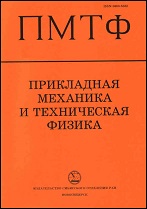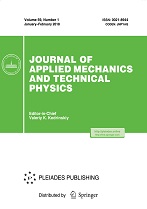|
This article is cited in 2 scientific papers (total in 2 papers)
Variational formulation of coupled hydrodynamic problems
S. A. Lur'eab, P. A. Belova
a Institute of Applied Mechanics, Russian Academy of Sciences, 125040, Moscow, Russia
b Lomonosov Moscow State University, 119991, Moscow, Russia
Abstract:
A method is proposed for constructing variational models of continuous media for reversible and irreversible processes based on the generalized Hamilton–Ostrogradskii principle, which reduces to the principle of steadiness for a non-integrable variational form of a spatial-temporal continuum. For dissipative processes, the corresponding linear variational form is constructed as a sum of variation of the Lagrangian of the reversible part and a linear combination of dissipation channels of physically nonlinear processes. Examples of using the variational approach to the description of hydrodynamic models are considered. The corresponding variational models of the Darcy hydrodynamics, linear Navier–Stokes hydrodynamics, Brinkman hydrodynamics, gradient hydrodynamics, and some generalization of the classical nonlinear Navier–Stokes hydrodynamics are constructed. For modeling irreversible processes of hydrodynamics with allowance for coupling of deformation with the associated physical processes of heat transfer, it is proposed to use variational formalism for the spatial-temporal continuum, where the spatial and temporal processes are considered simultaneously and consistently because the normalized time is a coordinate.
Keywords:
variational models, non-integrable variational forms, irreversible processes, spatial-temporal continuum, coupled hydrodynamics and heat transfer, Darcy equations, Brinkman equations, heat balance equations.
Received: 13.08.2021
Revised: 13.08.2021
Accepted: 30.08.2021
Citation:
S. A. Lur'e, P. A. Belov, “Variational formulation of coupled hydrodynamic problems”, Prikl. Mekh. Tekh. Fiz., 62:5 (2021), 145–160; J. Appl. Mech. Tech. Phys., 62:5 (2021), 828–841
Linking options:
https://www.mathnet.ru/eng/pmtf118 https://www.mathnet.ru/eng/pmtf/v62/i5/p145
|


| Statistics & downloads: |
| Abstract page: | 81 | | References: | 16 | | First page: | 7 |
|





 Contact us:
Contact us: Terms of Use
Terms of Use
 Registration to the website
Registration to the website Logotypes
Logotypes









 Citation in format
Citation in format 
